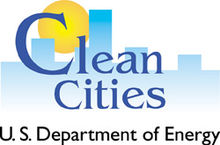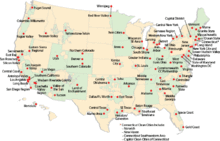- Clean Cities
-
Clean Cities is a government-industry partnership in the United States that provides regional coalitions with information and incentives from the United States Department of Energy (USDOE), a large collection of technical data and resources, and coordinated strategies and resources they can leverage to obtain maximum petroleum reduction. The Clean Cities partnership consists of 87 coalitions that work with 5,700 local stakeholder programs that have helped avoid the usage of over 2 billion US gallons (7,600,000 m3) of petroleum, put more than 500,000 AFVs on the road, and played a role in the construction of over 3,000 alternative refueling stations since 1993.
Contents
National Alternative Fuel Vehicle Day Odyssey
USDOE's Acting Assistant Secretary, John Mizroch, with the National Alternative Fuels Training Consortium and the Clean Cities partners from Virginia, Maryland, and Washington, D.C., launched the 2008 kickoff of the Clean Cities National Alternative Fuel Vehicle Day Odyssey. Also known as "Odyssey Day," the event is dedicated to promoting petroleum-free choices in transportation. The September 30 event is the first of more than 80 alternative fuel vehicle (AFV) events in over 60 locations across the nation.
American Recovery and Reinvestment Act
On 2009 Earth Day, Vice President Joe Biden announced the availability of $300 million in funding from the American Recovery and Reinvestment Act for state and local governments and transit authorities to expand the nation's fleet of clean, sustainable vehicles and the fueling infrastructure necessary to support them. The Clean Cities Alternative Fuel and Advanced Technology Vehicles Pilot Program will support at least 30 projects involving alternative fuels or advanced vehicles. Technologies eligible to be funded include a number of different light- and heavy-duty vehicles, including hybrid, plug-in hybrid electric, hydraulic hybrid, electric, fuel cell, and compressed natural gas vehicles. In addition, projects can support refueling infrastructure for alternative fuels, including biofuels and natural gas. Other efforts eligible for funds include public awareness campaigns and training programs on alternative fuel and advanced technology vehicles and infrastructure. The program requires a 50% cost share from participants.[1]
The Southeast Propane Autogas Development Program is the largest Clean Cities alternative fuel vehicle conversion deployment program in history. The Program is administered by Virginia Clean Cities at James Madison University and the Virginia Department of Mines, Minerals and Energy. The Program is converting fleet vehicles from gasoline to autogas in the Southeastern United States. The project received an $8.6 million grant from the American Recovery and Reinvestment Act.
Maryland
The Washington Metropolitan Area Transportation Authority. Better known as simply "Metro," the authority provides transit services to the metropolitan area in and around Washington, D.C. The authority has a fleet of 1,500 buses, including 74 hybrid electric buses and Metro plans to have nearly 500 more hybrid-electric buses by 2012. Vice Maryland Governor Martin O'Malley, who last year committed to convert the entire Maryland Transit Administration bus fleet to hybrid-electric buses by 2014. Maryland has already accelerated its purchase of hybrid-electric buses with the help of Recovery Act funds (Clean Cities).[1]
Tennessee
The State of Tennessee contains 2 designated Clean Cities coalitions: the East Tennessee Clean Fuels Coalition, and Clean Cities of Middle Tennessee. Both were designated in 2004. A third coalition--the West Tennessee Clean Cities Coalition--is forming. Many fleets in Tennessee use alternative fuels like the Great Smoky Mountains National Park, Eastman Chemical Company, cities like Memphis, Sevierville, Chattanooga and Kingsport, and the Tennessee Dept. of Transportation. As of Fall 2010, Tennessee has about 35 public stations where E85 is available, and the same where B20 is available. Tennessee's first public CNG station opened in Wartburg, Tennessee in late 2010.
The East Tennessee Clean Fuels Coalition holds quarterly open meetings in Knoxville, Chattanooga and the Tri-Cities area, and holds quarterly fleet manager meetings in Knoxville. These meetings are a key way the coalition works to 1) invite the community to come sit at the table and learn what is going on locally, and 2) find out how they can get involved using alternative fuels or collaborating on a community or regional project.
Criticism
While Clean Cities includes a scattering of funding for electrification and charging stations, most of it is for carbon-based liquid fuels or non-pluggable hybrids.[2] Clean Cities federal funding in 2010-2011 was setup with a majority of the funding favoring plug-in EVs and HEVs. However, the amount of funding and focus of that funding ebbs and flows between the alternative fuels over time due to advances in technology and interest in those fuels. CNG and propane were more popular in the early '00s, the biofuels ethanol and biodiesel took center stage in the mid '00s, and electric vehicles have taken the limelight most recently (2010-2011).
See also
- EPA Sustainability
- Greenhouse gas emissions by the United States
- Yellowstone-Teton Clean Energy Coalition
- Nashville Auto Diesel College
- Ohio Technical College
- Tarrant County College
- Traviss Career Center
- West Virginia University
- York Technical College
References
- ^ a b DOE Offers $300 Million in Recovery Act Funds for Clean Cities Program. Energy Efficiency & Renewable Energy News, April 29, 2009
- ^ The Ultimate Posting on Plug-In Hybrid Developments: Clip & Save. CalCars, September 22, 2009
External links
- Energy Efficiency & Renewable Energy (EERE) News
- EERE News: Clean Cities
- Yellowstone-Teton Clean Energy Coalition (YTCEC)
- East Tennessee Clean Fuels Coalition (ETCleanFuels)
- Clean Cities of Middle Tennessee
- National Alternative Fuels Training Consortium (NAFTC)
- Southeast Propane Autogas Development Program (SPADP)
Wikimedia Foundation. 2010.


